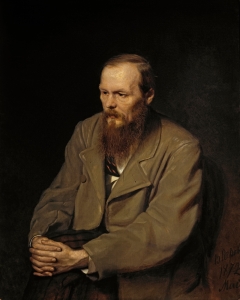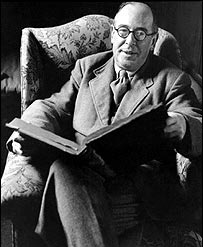The doctor’s prediction was fulfilled. Kitty returned home to Russia cured. She was not so gay and thoughtless as before, but she was serene. Her Moscow troubles had become a memory to her.

Dostoevsky: not known for easy reading
Anna Karenina has been my first Tolstoy book. Tolstoy intimidates me for two reasons. First, because you could bludgeon someone to death with even the paperback version of War and Peace. Second, because I have only read one other Russian author and that author happened to be Dostoevsky. That man’s prose is so dense that I feel like I am swimming through mud when trying to understand the dialogue between his characters. I understand that this problem lies with me and not him though. Not to mention, I cannot help but respect Dostoevsky because several of my favorite people happen to also be his devoted readers.
However, Dostoevsky aside, now that I am ankle-deep into this somewhat shorter story of Tolstoy’s, I find myself enjoying the experience much more than I expected. This story is akin to a picture album and each chapter a snapshot: compact, tidy, almost self-reliant. They all have a beginning, a middle, and an end, and this is much rarer of an occurrence than you might think. I just want to put some of these snapshots in frames and hang them around my home.
Kitty’s dilemma
One of those pictures, in particular, is the passage I shared with you above. We come to this passage at the end of Part II (of how many parts I am not completely certain yet). Kitty is a young woman who expects to be married. She falls in love with a man and mistakes his fondness for commitment. It is not until they both attend a ball and the man pursues another woman for the most important dance of the evening that the truth of the matter hits home for Kitty. Sadly, she has been deceived and the life that she imagined for herself falls apart right at the moment when she expects it to come together.

Leo Tolstoy: following a rich tradition of beardedness
And so we must watch Kitty try to come to terms with the harsh reality of rejection. Well-meaning family members try to console her, but Kitty lashes out like a drowning swimmer, hurting those who might pull her out of the water. She refuses to forgive the man who has hurt her, but this only hurts her more. Unfortunately, her sister is not the last person she lashes out towards.
Because of her refusal to dismiss this rejection, this memory begins to consume Kitty. By not facing this demon, her memory becomes her primary reality. And while this reality may have begun with the man who deceives her, it ends with Kitty. Her obsession with this shame becomes an obsession with self and she loses her ability to relate to others. She becomes so overwhelmed by her shame that her family calls a doctor to diagnose what they believe must be a physical illness. And what does he say? Well, he recommends sending her on a trip out of Russia. A splendid idea, it turns out.
kitty’s solution
It is on this trip that Kitty meets Varenka. Varenka is a young woman, adopted into the aristocracy that Kitty was born into, and possibly because of this she possesses the ability to spend none of her time concerned with her appearance. Instead, she spends all of her time serving those unable to take care of themselves. This fascinates Kitty and she finds herself unable to think about anyone but Varenka. She reaches out to this young woman and befriends her, wishing to know her secret.
She asks Varenka about her life, her past, and learns about a past love whom Varenka believed she would marry. Intrigued by this news, Kitty pries further into Varenka’s pasts, hoping to learn how she overcame the shame, and through this reveals her own story. Varenka soon realizes that they are no longer talking about her anymore.
“Tell me, isn’t it humiliating to think that a man has disdained your love, that he hasn’t cared for it?…the humiliation one can never forget, can never forget,” she said, remembering her look at the last ball during the pause in the music.
Kitty continues asking Varenka how she could not be humiliated and ashamed, but Varenka pushes back.
“Oh! if everyone were as sensitive as you are!” said Varenka. “There isn’t a girl who hasn’t been through the same. And it’s all so unimportant.”
“Why, what is important?” said Kitty, looking into her face with inquisitive wonder.
“Oh, there’s so much that’s important,” said Varenka, smiling.
“Why, what?”
“Oh, so much that’s more important,” answered Varenka, not knowing what to say.
Believe me, there is something I found frustrating about Varenka’s response as well. It can’t be so simple as just realizing there are other things that are more important. But maybe Varenka is onto something. Regardless of how we feel, we must act according to what we know is true. Even if we feel that a wrong done to us is unforgivable or that a certain shameful memory is inescapable, we can overcome it in the end by taking the first step of acting as we would if we had already overcome it.
charity: simple, but not easy
C.S. Lewis talks about this in Mere Christianity as he explains the finer points of Charity or “Love, in the Christian sense…that state of the will which we have naturally about ourselves, and must learn to have about other people.”
The rule for all of us is perfectly simple. Do not waste time bothering whether you “love” your neighbor; act as if you did. As soon as we do this we find one of the great secrets. When you are behaving as if you loved someone, you will presently come to love him. If you injure someone you dislike, you will find yourself disliking him more. If you do him a good turn, you will find yourself disliking him less…whenever we do good to another self, just because it is a self, made (like us) by God, and desiring its own happiness as we desire ours, we shall have learned to love it a little more, or, at least, to dislike it less.
A reasonable practice, even a simple practice, though certainly not an easy one. But this is what we are called to do and doesn’t Kitty’s experience reinforce the idea? She is taught by Varenka, through her actions, that actions not only may come before feelings, not only may help us overcome feelings, but can even play a vital part in molding them into something greater.
Kitty has already won a huge victory through her experience with Varenka and learning how to let a memory be no more than a memory. The feelings that consumed her soul and for so long paralyzed her ability to repay love with kindness have been overcome. Perhaps, and this is my hope (although I am nowhere near the end of the book), Kitty’s actions will help her to not only overcome her feelings of shame but enable her to even forgive the man who harmed her. Only time will tell as Kitty returns home to Russia.
What do you think? Can we feel a certain way if we act like we do for long enough? Is this something we want to do or is it insincere? Let me know in the comments below!


What I love about the actions preceding thoughts theory:
“We cannot solve our problems with the same thinking we used to create them.”
-Albert Einstein
It makes sense that Kitty must get out her own head to see clearly because anyone without her harshly tinted lenses would agree with Varenka:
“…there’s so much [else] that’s [more] important.”
And there’s absolutely sound evidence supporting the notion that our actions can shape and change our attitudes. If you haven’t already, find scientific support in this TED talk about the power of ‘faking it till you make it.’
I do, however, have something of an addendum to respectfully raise.
Obsession has deep roots. It seems strange to compare Kitty’s grudge and selfish shame to a substance addiction, but if you’ll humor me for a moment, consider:
In both cases the person is being in some way controlled and consumed by something they can’t break free of and while Varenka’s ambiguously wise advice is entirely rational, we can’t always act rationally in the face of our vices. We can’t let go of something if some pervading part of us insists on holding on, whatever our reasons, however dishonorable.
So in this light, maybe it must start internally. Maybe Kitty can never break free so long as she believes she deserves to be enslaved by this demon of hers.
A wise man recently told me, “Self pity is the worst grave you can dig yourself. Once you convince yourself yourself the end of the world has come, that becomes your reality, but don’t expect anyone else to stop marking their calendars.”
I bring this up because, to me, he was explaining his belief that your mindset determines your actions. I don’t mean to turn this into the chicken or egg debate. In truth, I believe both are influenced by each other. However, I place a lot of weight in the value of desire (conscious and subconscious). If more of you wants to be bound to some idea, point in time, some fix, someone, something– the will to combat that with your actions is hard to come by…despite copious giant, red, blinking signs and incentives that look an awful lot like miracles.
LikeLike
Thank you so much for your comment, I completely agree with your idea that Kitty’s behavior has some shared qualities with addiction. I love your phrase, “we can’t always act rationally in the face of our vices.” So true. Whether the light must start internally or externally, I think depends on the person. There are men like Viktor Frankl whose will could not even be broken by the chains of a concentration camp, but much of his strength came from using the skills of observation that he had been taught during his studies of psychology. It does really seem to be a chicken and egg dilemma.
LikeLike
Thank you Scott. This was a very enjoyable and informative piece to read. I absolutely believe that our feelings follow our actions, and our thoughts. It is not insincere at all, although it may initially feel that way. Feelings are important, but they can be fickle. In my own experience my feelings have changed due to my acting on what I knew was the right thing to do.
LikeLike
Thank you so much for sharing your wisdom, Mary, I think you are absolutely right about the fickleness of feelings. What you said reminds me of Lewis’ view on faith: “Faith, in the sense in which I am here using the word, is the art of holding onto things your reason has accepted, in spite of your changing moods.”
LikeLike